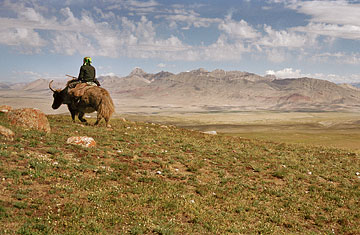
Wi-fi not available: Don't plan on checking e-mails in the Wakhan
Best Place to Escape the Office
Afghanistan
There was a time when coming to a country like war-torn Afghanistan would constitute "getting away from it all." But these days, your BlackBerry will work in Kabul, so a real escape requires extreme measures. That would be a trip to the Wakhan Corridor in Afghanistan's remote northeast — a refuge so remote that not even the Taliban bothered to visit it in their countrywide rampage. In fact, this narrow finger of land that reaches past Pakistan and Tajikistan to poke China is the safest place in Afghanistan, populated only by Kyrgyz and Wakhi nomads.
Getting to the valley trailhead involves a propeller-plane flight from Kabul and 21/2 days' drive along a rutted track. There's another day of pony-trekking over a mountain pass before you reach the start of a broad valley whose end lies far beyond the horizon. Few places are harder to get to, but no place is more worth it. Marco Polo spent nearly a year here, recovering from the strains of his epic travels, and the serrated, snowcapped peaks fringing the valley are home to the great sheep that bear his name — their spiral horns littering the passes and adorning nomad tents. (The grass was so rich, wrote Polo, that it took only 10 days to fatten an entire flock of sheep for the winter.) In 1891, at the peak of the Great Game, British explorer and spy Francis Younghusband dallied here as well, picnicking on caviar and champagne with a Russian general among the ancient beehive-shaped ruins of Bozai Gombaz, an old Kyrgyz settlement about three days' walk from the start.
Along the length of the valley, which takes four days to traverse, runs the source of the Amu Darya River, once known as the Oxus. This makes the Wakhan broad and flat and a pleasure to walk, but ponies offer a change of pace. Local guides, trained by the Aga Khan Foundation (AKF), offer expert introductions to the region's nomadic cultures. Food is simple — rice, lamb, yogurt — but you can easily augment it with a yak-load of your own goodies to last the two-week round trip. The AKF has also established a string of simple guesthouses and spacious yurts for trekkers along the length of the journey, meaning that you can enjoy many of the comforts of home, without the proximity of work. The office can still call you on a satellite phone, of course. But only until the batteries run out.